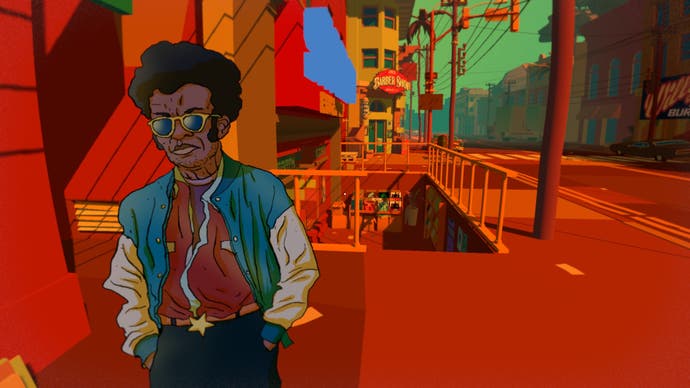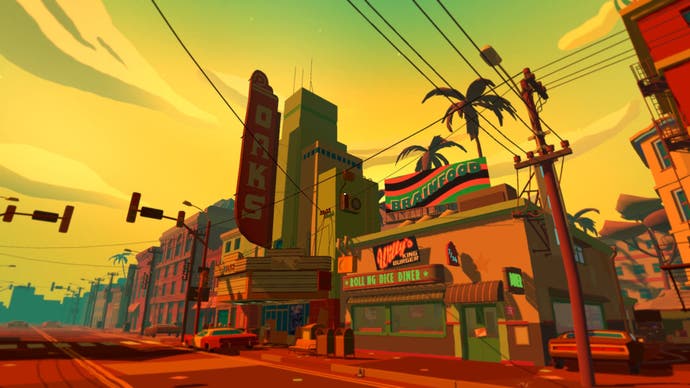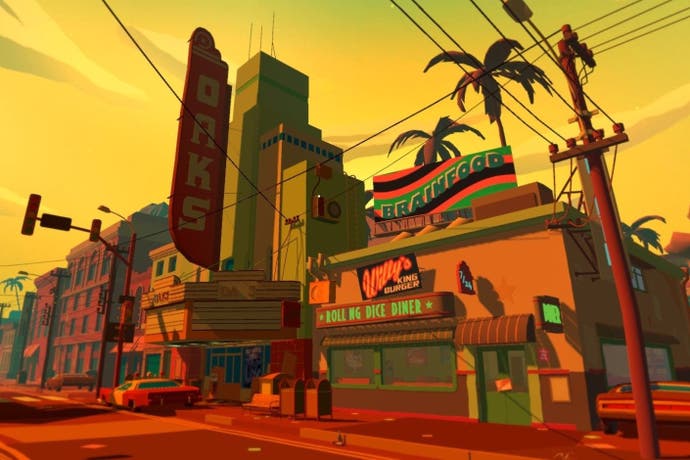Californium review
Golden state of mind.
I'm sat in a chair stabbing at a clacking typewriter in an attempt to get Californium's central character, sci-fi hack Elvin Green, out of a fug of cheap beer and amphetamines and over his writing block, when there's a hollow thump, thump, thump at the door. And so I stand, look out across Green's scrappy Berkeley apartment and set towards the door.
Except I can't remember how to walk.
It's 'W', right? That's always been the key we press to push forwards in first-person games. At least that's what I remember it being, but maybe I'm wrong. Maybe I'm getting my wires crossed, and I'm having dim recollections of another world where they do things differently. Yet still, there's something erringly familiar about it all. "We might reflexively reach for a light switch in the bathroom," the brilliant sci-fi author Philip K. Dick once wrote as he laid out his theories of alternate realities, "only to discover that it was - always had been - in another place entirely."

Within seconds, Californium gets to the essence of what makes Dick's work so special; warping the world with an everyday detail flipped on its head, the mundane turned into something mind-bending and magical. Maybe - and this is a chilling thought - there really is an alternate reality out there somewhere where people invert their mouse axis. Who knew control bindings could be so profound? Who knew, too, that one of the best Dick adaptations I've come across in any medium would be one that's entirely divorced from the writer's body of work.
This is a strange game for a strange writer, and it's full of such delicious little ironies. Developed by a couple of small, independent studios to coincide with a new French documentary on Dick, this gentle adventure in which you explore a single street isn't endorsed by the writer's estate, but it's utterly indebted and in thrall to him, from the Berkeley where Dick spent much of his writing life and where you begin this slim story, to the tumble of realities that cascade across those stoned streets.
You start as Green, holed up in that apartment penning copy for laxative adverts while you wait for inspiration to strike, before taking to a boulevard choking in a psychedelic 70s California haze, populated by cardboard cut-outs. In the punchy swabs of environmental colour and artist Olivier Bonhomme's expressive 2D character design there's something of Moebius. This is a very French game - fittingly so given how Dick's work found a welcoming home in the open-armed, sci-fi loving France long before it captured the imagination elsewhere - but really it's so intrinsically, wonderfully and flamboyantly Dick. There's none of the dark neon palette that Syd Mead and Ridley Scott chose for Blade Runner - a look that, both for better and for worse, has long been associated with Dick - and in its place is the bright, colourful craziness that danced across so many more of his written worlds.
Much of the thrill of Californium, for Dickheads at least, is picking out the tributes and references that make up the texture of all that you explore. It's an environment resonant with echoes of his work, full of grand mysteries and identity crises to smaller, more human details. On the corner of one far-fetched future is an I Ching Oracle - sadly out of operation - while characters swim in and out of view like half-remembered cameos: overbearing publishers with nicotine-stained teeth, ex-wives caught up in conspiratorial strife and androids with ideas above their station. I'm fairly certain I bumped into the Lysol Lady from the wonderful short story Strange Memories of Death at some point, but that's the thing with Californium, and Dick's work: you can never be too sure.
Dick was that delightful oxymoron, an autobiographical science fiction writer, so it's only right that Californium takes as much from his life as it does his work. There's an emphasis, it feels, on his later work, after the world broke down for him - or he broke down - in 1974, a revelatory experience that blurred the lines of reality in his own fictions. The Roman Empire never ended, Dick came to see as 70s Berkeley melted away around him, and so too do you, as Green, discover that your own Berkeley holds its own secrets; a brutal fascist regime in which you're a patriotic writer,or a Martian colony that's seeing its humanity being slowly eked out by a new synthetic order.
And so Californium is at its heart a hidden object game - a near-perfect mesh of theme and mechanic - and like Time Out of Joint's Ragle Gumm you're left ferreting through the scenery for cracks in reality: the lightbulb in the diner that flashes suspiciously, the books on the shelves of your apartment that seem to flicker out of view when your eyes are turned before they flash back into existence again. You're looking through four short chapters for small symbols in the environment that then reveal what's beneath in a long lysergic fizz.

The problem with Californium, though, is that it's not a particularly good hidden object game. A flickering television will tell you how many objects are to be found in each space, slowly ticking down until it taunts you with one or two that can seem impossible to find - an unknowable logic defines how certain tears reveal themselves, leaving you spinning on the spot while scouring each and every pixel. Sometimes you get caught in the cracks of Californium itself: having found the final piece in the puzzle in the penultimate chapter I was caught suspended in a wall, forcing me to reset and lose a whole hour's progress.
Maybe that's just about perfect, though? There's a sense of cosmic slapstick as you spin furiously around your publisher's office, investigating every light fitting for a crack in reality you swear is there, just as there's something so right about a game where you're constantly questioning whether what you're victim to is either a bug or a feature. I've crawled back to the start of Californium several times to see if those key bindings are still in place or if I was simply witness to some errant code, but each time they're perfectly preserved: 'W' does move you forward.
Maybe all that confusion was from another Californium, another game played at some point by another me in another world. This is an odd, limited and frequently frustrating experience, but it does a wonderful job of immersing you in Dick's universe, pulling you into a world of infinite possibilities - even if it's never quite sure what to make of the tangle. Like so much of Dick's work - words pulled from distant stars in late night amphetamine binges - it can be incoherent, rambling and a bit of a shambles. I think he would have approved.










